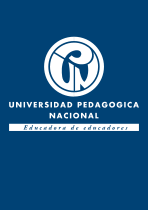Scientific Literacy : The Conceptual Framework Prevailing over the First Decade of the Twenty-First Century.

Citación
Fecha
2021-01-01Autor
Costa, António Manuel
Ferreira, Maria Eduarda
da Silva Loureiro, Manuel Joaquim
Enlace al recurso
https://revistas.pedagogica.edu.co/index.php/RCE/article/view/10293Palabras claves
Alfabetización científica
Estudio bibliográfico
Ciencia y sociedad
Investigación cualitativa
Entorno social
Keyword
Scientific literacyBibliographic study
Science and society
Qualitative research
Social environment
Metadatos
Mostrar el registro completo del ítemResumen
El término alfabetización científica surge como consecuencia de la necesidad de la comunidad científica de ver validada, por parte de la población, la producción científica y tecnológica. El constructo alfabetización científica fue objeto de varias actualizaciones conceptuales a lo largo de los años como resultado de los cam-bios científicos, tecnológicos y sociales de la sociedad contemporánea. En esta investigación se realiza una revisión sistemática en la cual se analiza la evolución de la alfabetización científica en la primera década de este siglo. Buscamos evaluar la evolución del constructo alfabetización científica durante la primera década del siglo XXI, a través de una investigación cualitativa, realizando un estudio bibliográ-fico. Para la operacionalización de este análisis, se definieron diferentes dimensio-nes de la alfabetización científica. Los resultados indican que es un constructo de naturaleza deíctica, que conforma su contenido a los entornos social, político, cultu-ral y científico en que se inserta. La conclusión es que toda esta matriz conceptual sugiere un cambio en la forma relativamente pasiva como se aprecia la ciencia y como esta funciona en la sociedad hacia un compromiso de implicación personal con la ciencia y hacia la valoración de la utilidad del conocimiento científico a lo largo de la vida.
Abstract
The term scientific literacy arises due to the need of the scientific community to see that the population validated its scientific and technological production. The construct Scientific literacy has been subject to diverse conceptual considerations over the years, arising from the scientific, technological, social and political chang-es that marked contemporary society characteristics. In this study, we sought to assess the evolution of the scientific literacy construct over the first decade of the twenty-first century, through qualitative research, using a bibliographic study. For the operationalization of this analysis, different dimensions for scientific literacy were defined. The results suggest that scientific literacy embodies a construct that is deictic in nature, shaped by the social, political, cultural and scientific contexts prevailing in the society it belongs to. The conclusion is that all of this conceptual matrix suggests a change in the relatively passive form in which science is appre-ciated of and the way this operates in society towards a commitment to personal involvement with science and towards the valuation of the importance of scientific knowledge throughout life. The term scientific literacy arises due to the need of the scientific community to see that the population validated its scientific and technological production. The construct Scientific literacy has been subject to diverse conceptual considerations over the years, arising from the scientific, technological, social and political chang-es that marked contemporary society characteristics. In this study, we sought to assess the evolution of the scientific literacy construct over the first decade of the twenty-first century, through qualitative research, using a bibliographic study. For the operationalization of this analysis, different dimensions for scientific literacy were defined. The results suggest that scientific literacy embodies a construct that is deictic in nature, shaped by the social, political, cultural and scientific contexts prevailing in the society it belongs to. The conclusion is that all of this conceptual matrix suggests a change in the relatively passive form in which science is appre-ciated of and the way this operates in society towards a commitment to personal involvement with science and towards the valuation of the importance of scientific knowledge throughout life.
Editorial
Editorial Universidad Pedagógica Nacional
